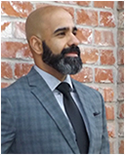

Dr. Talal Alsaleem
Connections! Chapter News
Mishka Clavijo Kimball
President's Message
Read
Madeline Taylor
January Membership
Meeting Write-Up
Read
January Board Minutes
Read
Member Columnists
Charlyne Gelt
Cinema Therapy
Penguin Bloom
Read
Contributors
Sue Cristol
What We Need to Know
About Conspiracy Theories
Read
Lynne Azpeitia
Getting Paid
Read
Scholarship
Stefanie Gabler
Read
Sponsors
Insight Treatment
Programs
Read
eBlasts
February 2021 eBlasts
Read
March 2021 eBlasts
Read
Contact Us
Read
Resources
Professional Resources
Read
Community Resources
Read
January Membership Meeting Write-Up — Madeline Taylor, LMFT
Systematic Affair Recovery Therapy
Presented by Dr. Talal Alsaleem
If you’ve never had a course on how to treat infidelity, you’re not alone. Discussions among therapists regarding the treatment of affairs may not happen as often as affairs themselves. Dr. Talal Alsaleem, creator of SART, Systematic Affair Recovery Therapy, mentioned some statistics which illustrate the extent of the problem:
- 46% of patients who seek psychotherapy do so because of the effects of an affair.
- 74% of men and 68% of women say they would have an affair if they could do so
without being detected.
These numbers surprised me. What doesn’t surprise me is the emotional pain caused by a partner’s infidelity, and sometimes, the degree of unconscious and/or unspoken emotional pain existing inside the unfaithful one, as well.
Dr. Alsaleem revealed that what drew him to this issue was an affair which occurred in the marriage of a close relative. Because he was affected by this, he realized how many people, peripheral to the couple themselves, can be negatively affected by an extra-marital affair. His day-long presentation covered the causes of infidelity, the impact of infidelity, the present models of treatment, and his own model, Systematic Affair Recovery Therapy.
The causes of infidelity fall into several overlapping categories: Relationship issues; unmet physical and emotional needs, general incompatibility, poor communication skills, poor conflict-resolution skills, being overwhelmed by life stressors, and failure to adapt to changes such as the birth of a child, financial ups and downs, etc. Mental health issues; the presence of Bipolar states, personality disorders, sexual abuse, and addictions. And socio-cultural factors such as gender-role expectations, cultural norms like machismo, power disparities, and the burdens of occupational stress. Often we’ll find several of these factors simultaneously affecting marital dissatisfaction and impelling one partner or the other to escape into an affair.
Dr. Alsaleem stressed that an affair constitutes a traumatic loss of trust. Everyone related to the unfaithful partner, the betrayed partner, and the third party is somehow affected. I have seen many patients over the years whose mother or father had secret, or not-so-secret, affairs. Every one of those patients had his/her ability to trust a romantic partner severely compromised by this breach of relational fidelity in the parental relationship. There can be tangible physical repercussions such as disease-transmission; emotional repercussions such as hurt, anger, anxiety, and depression; and finally behavioral enactments between and among those affected by the affair which can further harm individuals or relationship-security.
While most therapists will recognize infidelity as a symptom of unconscious or unaddressed relational dissatisfaction, many of us might miss the unobserved socio-cultural factors, underlying trauma-related factors, or the couple’s expectations based on heteronormative patterns, which can affect how they “see” one another.
Dr. Alsaleem evolved Systematic Affair Recovery Therapy over years of observing the scope of issues which affected his clients and the themes he heard repeatedly in couple after couple. He wanted a comprehensive overview of the scope of each couple’s problems which had been thrust into the foreground of their lives because of the affair. These are the core principles of his approach:
1) Infidelity is a conscious breach of the spoken and unspoken expectation that marriage implies exclusivity. 2) Healing from the trauma of infidelity doesn’t always result in repair of the damaged bond of trust or the marriage itself. 3) Infidelity is driven largely by unconscious needs and self-awareness and psychological development can’t occur without lifting those unconscious needs into higher degrees of conscious awareness. 4) The true narrative of the affair must be examined for self-awareness to occur. 5) The main goal of an affair-recovery program is to process the trauma of the infidelity; to understand what happened, why it happened, and where we go from here.
Dr. Alsaleem outlines 7 distinctive milestones in the recovery process:
- Setting the Stage: He works with the couple to understand each person’s needs in the present moment. Logistics need to be established to secure new boundaries and a sense of emotional safety. Will they still live in the same house? Inhabit the same bedroom? How do they minimize the influence of friends and family or the involvement of the third party? He helps the couple prepare for challenges during this process; acknowledging the non-linear nature of recovery and how difficult it might be to carry on with normal life while dealing with abnormal circumstances. He also goes over the options of individual, couple’s, family, and group therapy for any and all members of the family.
- Getting the Story: He helps each partner prepare to hear or tell the story of how this affair occurred. During this process he comes to understand something about each partner’s needs and feelings, plus something about their communication patterns. Dr. Alsaleem uses some agreements which help the couple keep the story-telling dialogue within emotionally safe parameters. He is careful to promote authenticity while monitoring the appropriate level of disclosure.
- Acknowledging the Impact of the Infidelity: Dr. Alsaleem acknowledges and validates each person’s feelings; addressing the issue of accountability without judging or blaming; assessing damage to individuals and to the relationship; and providing a “holding environment” for the emotionally-charged interaction. He helps each partner articulate their understanding of the impact of the infidelity; facilitates apology if possible, and helps each partner articulate what they need from the other in order to manage or lessen the hurtful impact. Dr. Alsaleem disclosed that sometimes it’s hard not to empathize with one partner more easily than the other. However, he claimed that if we can maintain an empathic, non-judgmental curiosity about each person’s complex needs and feelings, it’s possible to facilitate the self-reflection necessary to help both partners process the trauma and grow from it.
- Choosing a Path: Dr. Alsaleem explores the history of the relationship before the affair, each partner’s understanding of the cause of the affair, and how they’re feeling about one another at this point. He listens carefully to understand what might be preventing one or both partners from choosing a path which could optimize recovery from the affair.
- Create a Plan to Separate or Rebuild the Relationship: Then Dr. Alsaleem helps the couple reach consensus, clarifying their true motives for the choice to separate or work on rebuilding. He helps them choose a start time and decide upon short-term and long-term goals. Then he develops concrete steps and measurable indicators.
- Implementation and Healing Pains: As the couple implements the plan of recovery, whether separating or rebuilding the relationship, Dr. Alsaleem keeps them on track by monitoring how each is feeling, remaining non-judgmental and empathetic as they work through the healing pains. I would add that re-traumatizations are likely during this time, whether they are staying together or separating. Insult and injury can occur as each grapples with the revival of hurt, anger, and disappointment, in their own way.
- Sustainability: As their lives proceed, Dr. Alsaleem aids the couple in sustaining their new baseline for a better relationship. He helps them stay in touch with their feelings and needs, keeping them conscious as much as possible. Paying attention to warning signs becomes important and encouraging them to check in with themselves and their partner helps to sustain better communication between the two of them. A last clinical objective is to create immediate and aggressive interventions should there be the threat of a rupture in the fragile, re-established bond of trust.
Dr. Alsaleem, calm and confident throughout his presentation, acknowledged that working with couples where there has been a grievous betrayal of trust has its challenges and pitfalls. It is challenging to define your role, to structure the sessions and lay out a format for how the three of you will proceed. It is challenging to maintain a therapeutic alliance with both partners and to manage the complexity of transference and countertransference issues which are likely to arise. There are pitfalls: our own “buttons” get pushed; we can feel inadequate, we get frustrated, we find ourselves taking sides or trying to educate instead of facilitating self-reflection.
We certainly didn’t enter this profession because it was easy, and Janet Malcolm didn’t call it “the impossible profession” for nothing. However, it is not our responsibility to repair the relationship, only to do our best to provide a growth-enhancing environment where the trauma of ruptured trust can be processed as fully as possible. As we support our clients, Dr. Alsaleem’s model supports us. I appreciate his accumulated wisdom and his guiding hand as therapists approach the uncertain task of re-weaving broken bonds.
 Madeline Taylor, PhD, LMFT, has been in practice for 40 years. She is associated with the Institute of Contemporary Psychoanalysis and has taught attachment theory, self-psychology, and intersubjectivity theory for 30 years. She has offices in Santa Monica and Calabasas, seeing adolescents, adults, and couples. “Nothing is as powerful as human understanding.” (George Atwood)
Madeline Taylor, PhD, LMFT, has been in practice for 40 years. She is associated with the Institute of Contemporary Psychoanalysis and has taught attachment theory, self-psychology, and intersubjectivity theory for 30 years. She has offices in Santa Monica and Calabasas, seeing adolescents, adults, and couples. “Nothing is as powerful as human understanding.” (George Atwood)